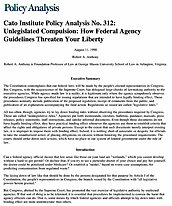All too often, though, agencies try to lay down binding rules without observing the procedures required by Congress. Those are called “nonlegislative rules.” Agencies put forth memoranda, circulars, bulletins, guidance, manuals, press releases, policy statements, staff instructions, and similar informal documents. Even though those documents do not have legally binding effect, they have practical binding effect whenever the agencies use them to establish criteria that affect the rights and obligations of private persons. Except to the extent that such documents merely interpret existing law, it is improper to impose them with binding effect. Indeed, it is nothing short of autocratic or despotic for officials to take the unauthorized action of placing obligations on citizens without honoring the procedural requirements. The courts should strike down such actions, which have no place in our system of limited government under the rule of law.
Unlegislated Compulsion: How Federal Agency Guidelines Threaten Your Liberty
The Constitution contemplates that our federal laws will be made by the people’s elected representatives in Congress. But Congress, with the acquiescence of the Supreme Court, has delegated large chunks of lawmaking authority to the executive agencies. While agency-made law is a reality, it is legitimate only where the agency scrupulously observes the procedures Congress has specified for issuing regulations that are intended to have legally binding effect. Those procedures normally include publication of the proposed regulation, receipt of comments from the public, and publication of an explanation accompanying the final action. Regulations so issued are called “legislative rules.”
About the Author
Robert A. Anthony is Foundation Professor of Law at George Mason University School of Law in Arlington, Virginia.

This work is licensed under a Creative Commons Attribution-NonCommercial-ShareAlike 4.0 International License.
